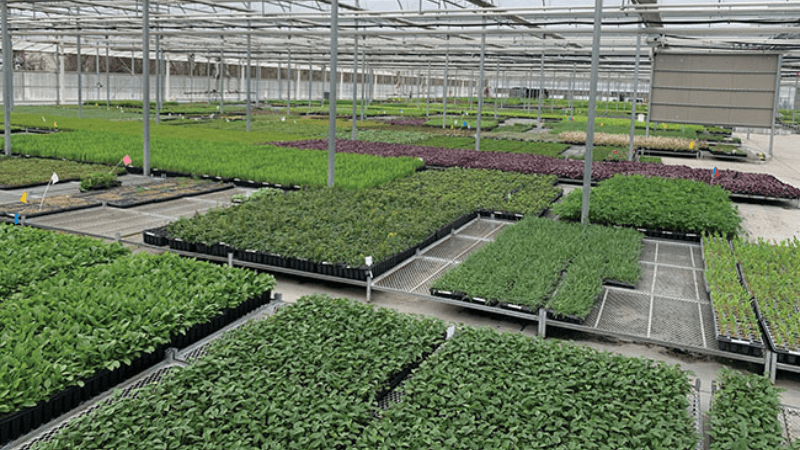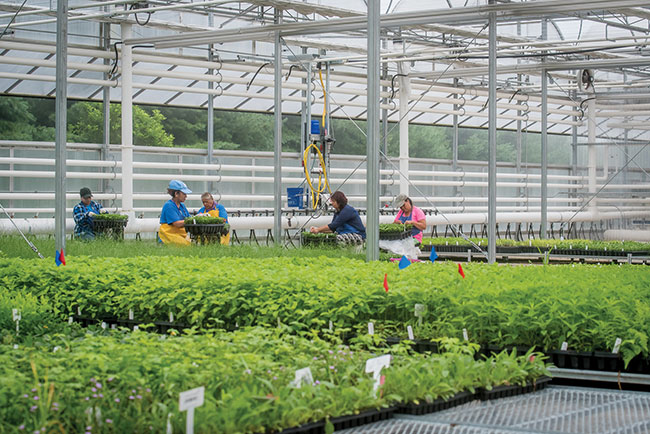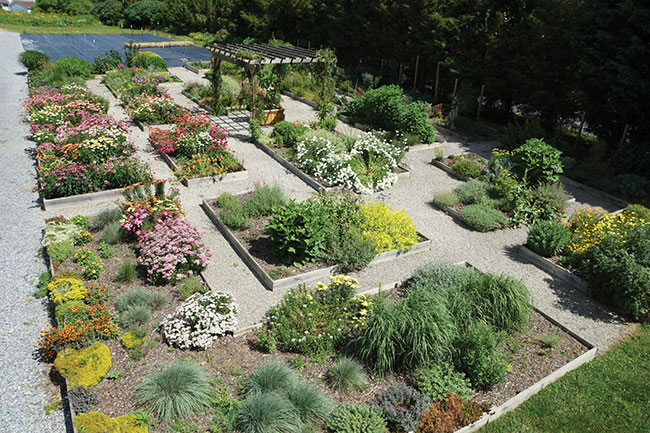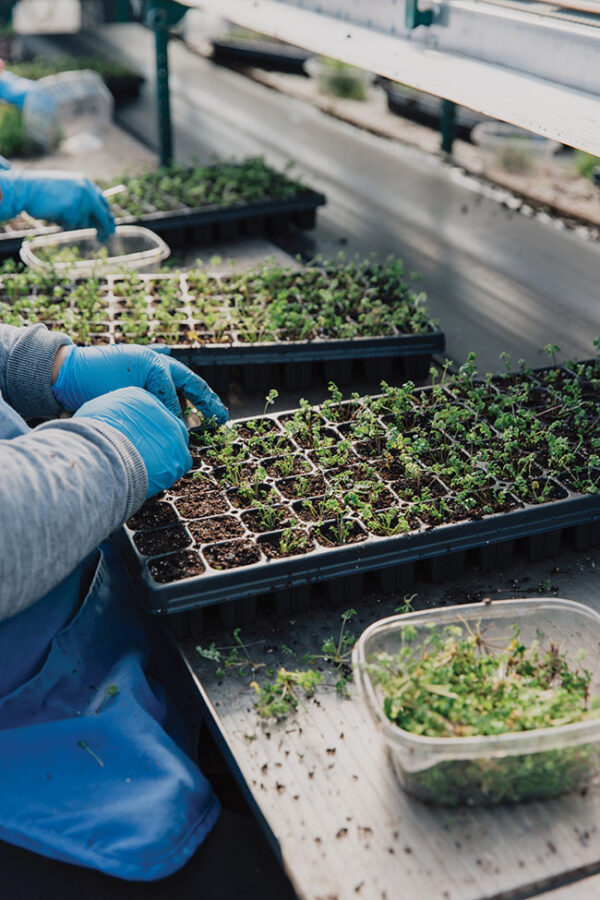
Where horticulture meets ecology
As a wholesale propagation nursery and a leader in the development and practice of sustainable horticultural systems, Landenberg, Pennsylvania-based, North Creek Nurseries specializes in growing starter plants or plugs of perennials, ornamental grasses, ferns, vines and shrubs.
The company targets customers in both the horticulture and ecosystem services markets, working with growers, landscape professionals and perennial enthusiasts.
“This is our 35th year,” said Steve Castorani, owner and CEO, who formed the nursery with Dale Hendricks in 1988. Hendricks had been in the perennial propagation business while Castorani came from a design landscape/build and garden center background.
“Plug production was new in the market at the time, and even newer were native plants, native plant cultivars and natural landscapes,” Castorani said. “We put our heads together and started with a concept of using plants in more natural environments.”
The partners were fairly ecologically conscious folks and started to build a plant palette to propagate. They focused on perennials and grasses, later mixing in ferns, vines and a few shrubs.
IN THE BEGINNING
When the business first began, there were several challenges, especially since the partners started the nursery pretty much from scratch.
“We purchased the property from a shuttered former mushroom-growing facility, so it wasn’t a nursery,” Castorani said. “We started in my backyard in Hockessin, Delaware, with a small greenhouse and some outdoor space. Dale brought his plant inventory and we worked there until we could build infrastructure out at the farm in Landenberg, Pennsylvania.”
Those early days included working with people they knew in the industry and had previous relationships with such as other nurseries, contractors and landscape architects who were buying inputs. The duo began to develop their business plan.

“In the marketplace where we saw ourselves, there wasn’t really a market established or a strong consciousness of native plants, ecological landscapes or ecosystem services,” Castorani said. “Along with that, we started to explore new markets. We worked with engineers and landscape architects who had a different vision of corporate landscapes.”
For example, one of North Creek’s first projects was to work on the restoration of the Richmond National Battlefield Park in Richmond, Virginia.
“We were hired to custom grow native grasses to revegetate that landscape,” Castorani said.
During those first years, North Creek didn’t just grow native plants, they also grew superior horticultural selections, and over time, they were persistent and convinced customers that these high-quality plants were also very aesthetically pleasing and could be grown by the nursery industry.
“Even today, about 70% of our customer base are wholesale nurseries who take our plants and pop them up, finish them to larger sizes, and sell them,” Castorani said. “The other 30% will be used to establish ecological landscapes with plants planted directly into the ground.”
CONTINUING TO EVOLVE
The company’s mission statement is to propagate and market plants that develop the relationship between people and sustainable outdoor environments, with a vision to be, in its customers’ judgment, a leader in the development and practice of sustainable horticultural systems, producing world-class plant material.
In 2001, North Creek did some research and tested a market for a product that they eventually called Landscape Plugs.
“Those are plants that we still grow and that’s been a robust market for us over the last 20 years or so,” Castorani said. “So, when you are looking at larger landscapes or landscapes that are engineered, you can plant more plants per square foot at a smaller size. This becomes more economical in plant cost and labor to populate landscapes.”
Today, North Creek Nurseries is comprised of the 17-acre Landenberg Nursery, which boasts 38 greenhouses, 111,408 square feet of production space, a GGS greenhouse, a Visser boom irrigation system and three acres of trial and demonstration gardens; and the 28-acre Oxford Nursery, which features 32 greenhouses and cold frames, 200,668 square feet of growing space, with a GGS greenhouse and Zwart Perfect Rain boom with a Zwart control system.
The latter has recently been expanded by two acres of greenhouses and there’s room for future growth. The Landenberg home also outfits North Creek Nurseries offices and has a pretty extensive trial garden.

“We introduce plants into the landscape market. We do a lot of testing of plants to see how they perform and function,” Castorani said. “As part of our marketing and plant trials department, we manage about four acres of trials and planted landscapes.”
Some of the plant material is used for engineered landscape systems, native plant re-establishment and natural landscape design installations. The company offers a lot of plant solutions for stormwater remediation.
“We have plants that benefit pollinators,” Castorani said. “Wildlife habitat is one of our key focuses, so many of the plants that are in the trial gardens here are in functional landscapes. So, when people come to visit, they can see the trial gardens to view the different flowers, grasses and ground covers. We then tour them through some of these engineered landscapes where we have rain gardens, bioswales, constructed wetlands and green-roof structures. We educate them as to how we mitigate stormwater here at the nursery. This can translate to how our customers might do those same things at their nursery, in urban environments or suburban landscapes.”
A TEAM APPROACH
North Creek Nurseries employs roughly 90 people full-time and operates on two farms. “Our greatest assets are the employees that make North Creek what you see today,” Castorani said. The key members of the North Creek team include each person employed by the company, including those involved in propagation and growing, inventory and maintenance, quality control and shipping, customer service and sales, plant trials and marketing, and finance.
The communications team, led by marketing manager Carrie Wiles, works to translate efforts made across departments into internal and external marketing collateral supportive of both the horticultural and ecosystem service markets — from in-hand product and resource guides to interactive online resources including their online library, The Plug blog, website, and social media outlets.
TECH TALK
North Creek is currently in the final phase of implementing its most notable transition to date in terms of operating systems.
“As part of our strategic vision, the entire team has made considerable adjustments over the past 18 months to transition from one platform that runs inventory, production planning and crop scheduling, order placement and fulfillment, and administrative controls — touching every single pillar of our company — to an enhanced system,” Wiles said.
“In addition to streamlining our interdepartmental communications, the value-added asset is the power to hone in on targeting data models and drill down on the metrics of our business.”
The company has also made a considerable investment in lean processes and manufacturing, which has helped set it apart and allow North Creek to become more organized and efficient.
“We continue to look for ways to employ technology to achieve day-to-day operational wins that translate into more precisely controlling our overall costs,” Castorani said. North Creek is in a massive transition ow in terms of its operating system.
“We made a strategic plan in the past 18 months to transition from one platform that runs our inventory, production planning, scheduling and administrative components, as well as having a role in every single department of our company, to a new system,” Wiles said. “What we’re able to utilize to extrapolate some of the data is the power of metrics to really pull together some tables targeted into our specific criteria.”
The company has also made a big investment in lean processes and manufacturing, which has helped set it apart and allowed it to become more organized and efficient.
“We continue to look for ways to use technology to get some gains and control our costs,” Castorani said.
PRODUCT AND PLANT INTRODUCTIONS
The gardens team is responsible for evaluating plants over a three-year period, and for most new products that come in, the team works with a network of plant introducers, both domestically and internationally, according to Wiles.
“When material comes in, we evaluate it in what we call our comparison trial gardens and have a side-by-side look at most of our sun-loving and shade-loving species that we offer,” she said. “We are evaluating the plants in these studies against specific criteria, including that they are hardy to the mid-Atlantic region because this is where a majority of our customers are based.”
The plants that North Creek potentially will bring to market do not express or show tendencies to be overly aggressive or invasive in the landscape.
“If it comes from seed, we have to make sure we have an adequate seed source,” Castorani said. “Or if a plant is coming out of tissue culture, since we do not have a tissue culture lab, we have to work backward with certain processes to figure out the propagation timing and production protocols.”

North Creek often collaborates with local institutions such as Mt. Cuba Center, a native plant botanical garden in Delaware. A few years ago, it helped introduce a native iris that had a lot of horticultural interest expressing great purple foliage that emerges in the spring. The two collaborated to bring it forward into the market.
Plus, when a university like Clemson is researching native butterflies and their larvae, they know they can reach out to North Creek and get plants that have not been sprayed with chemicals that harm beneficial insects, so their research will stand true.
 BUILDING ON SUCCESS
BUILDING ON SUCCESS
North Creek is not just focused on the newest of the new or taking flash-in-the-pan perennials to market. It feels its plant palette is what makes the company unique.
“In honoring and celebrating our 35th anniversary, we took a really strong look at the plant palette from where we started versus where we are now, and it’s quite refreshing to see some old standbys still in production,” Wiles said. “We have the industry favorites and some of the new products that have been able to prove themselves out in the marketplace.”
Looking ahead, the company plans to continue looking at efficiencies and position itself for the future by building on the foundation it has developed over 35 years.
“Our Value Statement — working in and promoting sustainable environments while delighting our customers and providing opportunities for continuous learning — stems from the rewards of education. We make every effort available for our folks to thrive — not only at North Creek — but for the industry overall,” Castorani said.


 Video Library
Video Library 




















